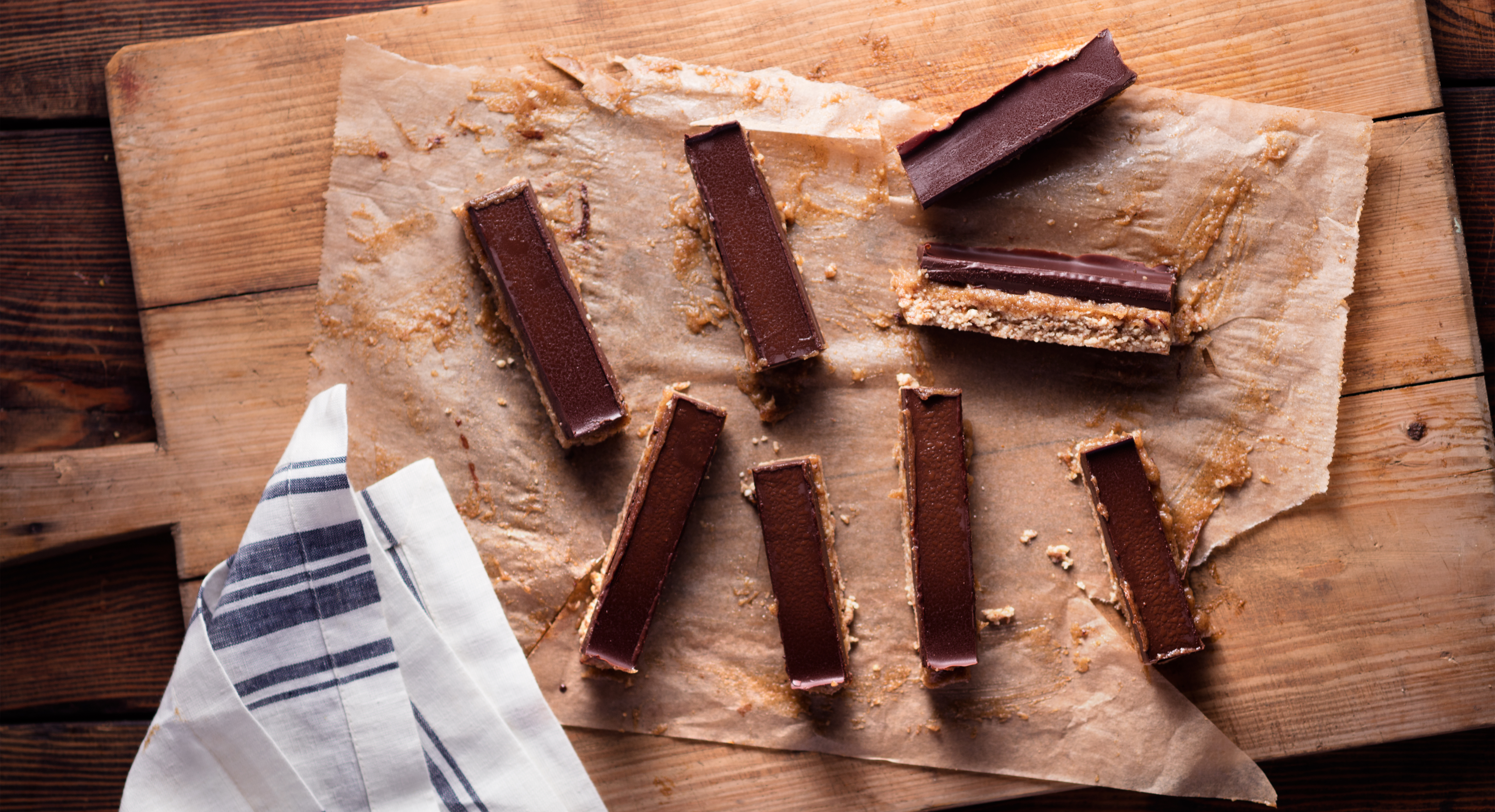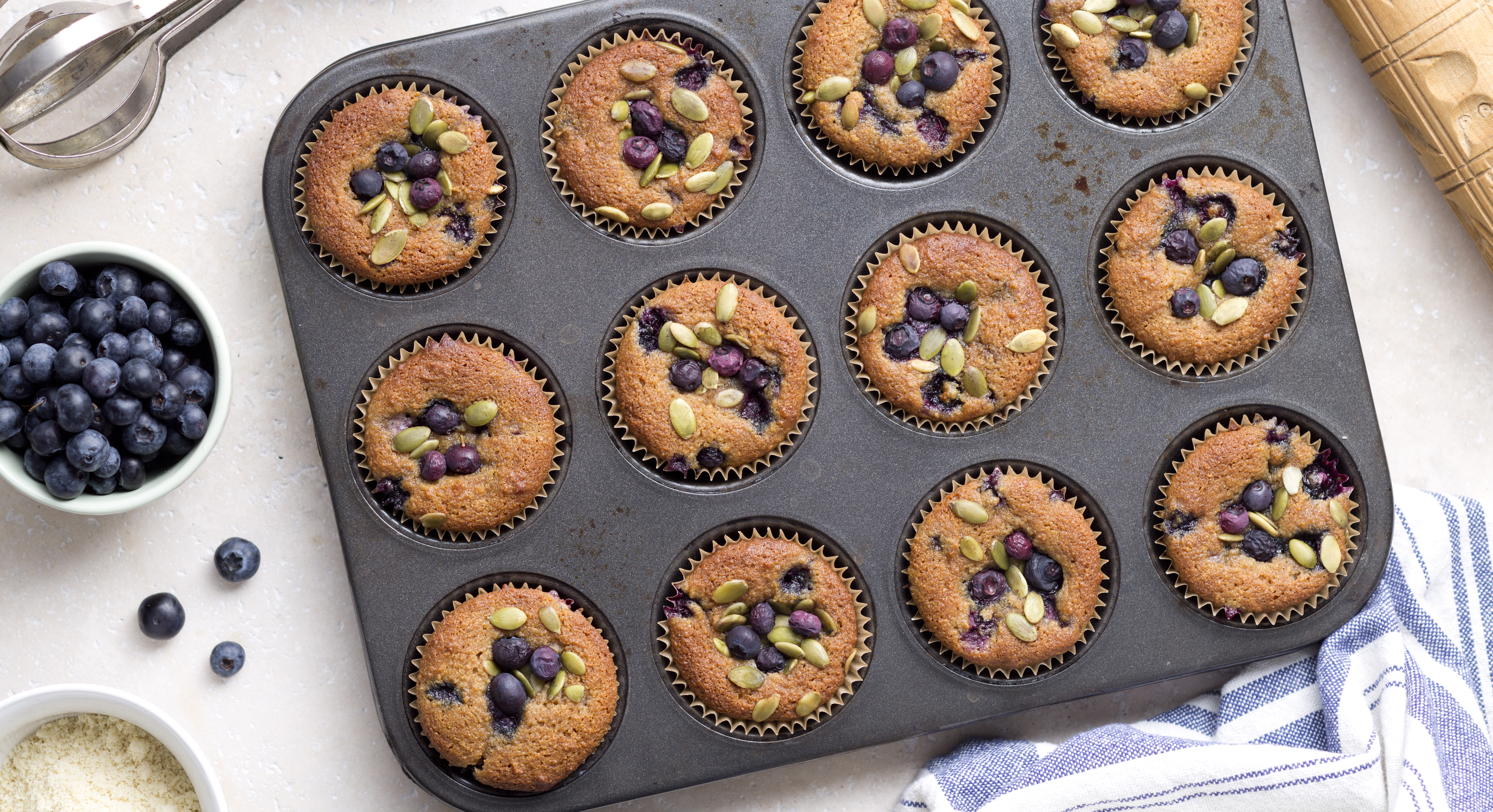Coconut Flour vs. Almond Flour Differences
Publish Date: January 24, 2020
Last Update: January 25, 2026
No wheat? No problem. Baking without using all-purpose, whole-wheat, or white whole-wheat flour doesn’t have to cramp your baking style. Whether you’re gluten-free or not, these days it’s both fun and (relatively) straightforward to bake muffins, cakes, breads, and cookies with alternative flours [1].
We’ll compare two of the most common gluten-free flour alternatives, coconut flour vs. almond flour, to see how they stack up. The secret to success? Understanding how these flours operate.
Flours may have different weights and moisture content, for example, so it’s often not quite as simple as swapping flours in 1:1 in your favorite recipes [2]. Nothing to fear, though! Today we’re looking at the differences between coconut flour versus almond flour, sharing our favorite baked goods to whip up, and giving you the tips you need to confidently bake with these must-have ingredients.
What Is Coconut Flour?
Coconut flour is made from dried coconut meat, a natural byproduct of coconut milk production. When coconuts are pressed for milk, bits of coconut meat remain, which are then dried at low temperatures and ground to a soft powder.
Is coconut flour gluten-free?
Yes! Coconut flour is naturally gluten-free and grain-free.
Can you substitute coconut flour for almond flour?
Generally, yes. However, it’s important to know coconut flour is more absorbent than almond flour, so you’ll likely need to adjust the amount of liquid you use, and increase the number of eggs in your recipe.
What Is Almond Flour?
Almond flour is exactly what it sounds like: flour made from almonds. It’s typically made from finely ground blanched almonds (with the skins removed) [3].
Is almond flour gluten-free?
Yes! Almond flour is gluten-free and works for grain-free and paleo diets.
Is almond flour keto?
Definitely. Nuts and seeds are A-OK on a ketogenic diet, so add almond flour to your basket [4].
Is almond meal the same as almond flour?
Pretty much, but with a couple of key differences. The terms almond meal and almond flour are often used interchangeably, as both are made with finely ground almonds. However, almond flour is often more finely ground and offers a more uniform consistency. Also, products labeled “almond flour” use almost exclusively blanched almonds, while almond meal may use unblanched [5].
Baking With Coconut Flour
Coconut flour can be a welcome ingredient for paleo, gluten-free, and grain-free diets, but that doesn’t mean there aren’t any downsides. Here are some of the most common challenges associated with coconut flour—plus how to avoid them.
It’s a sponge
Coconut flour is known for being extra absorbent, which means it’ll soak up a larger amount of liquid than you think is possible.
It can be dry
Coconut flour’s high-absorbancy characteristic sometimes translates into dry baked goods. To counteract this effect, be sure to use plenty of eggs—egg whites’ protein provides structure, and the yolks add moisture.
It might be gritty
No one likes a gritty texture in muffins or pancakes. To smooth things out, sift your flour before combining it with wet ingredients.
It can be heavy
Absorbing all that liquid can leave your baked goods feeling heavy. Here’s a trick: Beat your egg whites until they hold stiff peaks, then gently fold them into your batter to help lighten up the end result.
How to Make Almond Flour
Almond flour is readily available in most grocery stores (including ThriveMarket.com, of course!) but DIY types can easily make it at home. Purchase a bag of blanched almonds, and pulse them in your food processor until finely ground. That’s it! Just sift the almond flour to remove any large pieces and you’re ready to bake.
Coconut Flour Vs. Almond Flour Nutrition Facts
When choosing which flour to use for all your baking needs, you may want to consider the differences in nutrition facts between almond flour and coconut flour to determine what best fits your needs.
For each 2 tablespoon serving, coconut flour has 70 calories, 11 grams of carbs, 3 grams of protein, and 8 grams of dietary fiber. Coconut flour is also a good source of iron (20% Daily Value) and potassium (8% Daily Value).
In 2 tablespoons of almond flour, you’ll get 80 calories, only 2 grams of carbs, 3 grams of protein, and 1 gram of dietary fiber. While coconut flour is a better source of dietary fiber, iron, and potassium, almond flour does contain iron (2% Daily Value) and calcium (2% Daily Value).
Flour Recipes
Coconut Flour Recipes
With coconut flour, you can cook everything from breakfast (pancakes) to dinner (gnocchi), plus plenty of tempting baked goods.
Coconut Flour Pancakes
Start your morning with paleo-friendly pancakes whipped up with coconut flour, lots of citrus, and vanilla.
Cauliflower Gnocchi
Traditionally made with potatoes (a keto no-no), our modern-day gnocchi recipe means you can still enjoy this comfort food dish while following a ketogenic diet. Ingredients like coconut flour and cauliflower make it possible!
Homemade Twix Bars
Yes, you can still enjoy a favorite childhood candy—with a twist that’s a bit more wholesome. These bars are made with a combination of almond and coconut flour, plus creamy cashew butter, plump dates, and maple syrup.

Chocolate Hazelnut Coconut Flour Crepes
Need a reliable coconut flour dessert? Light and airy crepes are always elegant, even when made with coconut flour. We roll ours with a rich hazelnut spread, crunchy cacao nibs, and berries for a little sweetness.
Vegan Coffee Cake
If your afternoon cup of coffee needs a buddy, we recommend a slice of vegan coffee cake. The batter comes together quickly and combines coconut flour with ground coffee for an extra kick and maple syrup for sweetness.
Paleo Hot Cross Buns
In this recipe, a traditional baked good gets a gluten-free upgrade with three types of flours: coconut flour, almond flour, and tapioca flour.
Almond Flour Recipes
Almond flour adds tenderness and a slightly nutty texture to baked goods. Our blog has plenty of ways to try this ingredient, including some savory surprises.
Gluten-Free Blueberry Muffins
These fruit-studded muffins are made with almond flour and ghee for moist texture, and flavored with cardamom, cinnamon, and vanilla.

Low FODMAP Turkey Meatballs
Instead of bread crumbs, almond flour helps hold together these tender turkey meatballs. Serve them over a plate of zoodles for a comforting meal that’s low FODMAP-friendly.
Salmon Burger With Avocado Salsa
Non-GMO wild pink salmon forms a burger base that includes almond flour, green onions, and organic herbs and spices.
Flourless Apricot Almond Cake
This gorgeous tea-time cake pairs easily with your favorite brew. The almond-flour batter is sweetened with a touch of organic honey and topped with ripe apricots and crunchy pistachios for texture.

Paleo Blueberry Pie With Almond and Coconut Flour Pie Crust
White flour is nowhere to be found in this paleo-friendly pie. The almond-flour, coconut-flour, and tapioca-flour crust holds up to a sweet blueberry filling that’s coated in coconut sugar before baking.
Coconut Flour Products
Curious about coconut flour? Pick up one of these bags to start experimenting.
Thrive Market Organic Coconut Flour
With protein and fiber in every serving, gluten-free and organic coconut flour makes a fine addition to any diet. Ours is made from dehydrated coconut meat and is ready for your next baking project.
Bob’s Red Mill Organic Coconut Flour
Each serving of Bob’s Red Mill coconut flour delivers 5g of fiber and 3g of protein. Add this ingredient to your pantry to create light, tender, and gluten-free recipes.
Almond Flour Products
These best sellers are a hit with Thrive Market members.
Thrive Market Almond Flour
Our almond flour is made from non-GMO ground almonds, making this a grain-free and paleo-friendly option for all sorts of baking projects.
Simple Mills Almond Flour Crackers
Simple Mills is a favorite brand among those on a gluten-free diet, and these almond flour crackers are one of our top sellers. They’ll put you in a “can’t have just one” situation—just so you know.
Benefits of Coconut Flour vs. Almond Flour
| Criteria | Coconut Flour | Almond Flour |
| Gluten-Free | Yes | Yes |
| Nutritional Content | High in fiber, protein, and healthy fats | Rich in healthy fats, protein, and vitamins |
| Carbohydrate Content | Lower | Lower |
| Texture in Baking | Absorbs more liquid, denser texture | Light and airy texture |
| Flavor Profile | Mild coconut flavor | Mild almond flavor |
| Use in Recipes | Suitable for both sweet and savory recipes | Ideal for desserts and baked goods |
| Allergen Information | Nut-free, suitable for those with nut allergies | Contains nuts, may not be suitable for nut allergies |
| Cost | Generally more affordable | Slightly more expensive |
| Nutritional Advantages | High in fiber, aiding digestion | Rich in vitamin E, promoting skin health |
| Unique Health Benefits | May help regulate blood sugar levels | Supports heart health and weight management |
| Health Downsides | High in saturated fat if consumed in excess | High in calories, may not be suitable for low-calorie diets |
| Baking Properties | Requires more moisture, may need additional eggs or liquids | Requires less moisture, can be used as a 1:1 substitute for traditional flours |
Coconut Flour vs. Almond Flour: Health Downsides
While both coconut flour and almond flour have their nutritional benefits, they also come with certain downsides. Here are some cons of each:
Coconut Flour:
- High in Saturated Fat: Coconut flour is relatively high in saturated fat, which, when consumed in excess, may contribute to elevated cholesterol levels. However, moderation is key.
- Caloric Density: Coconut flour is calorie-dense, so it’s important to be mindful of portion sizes, especially if you are on a calorie-restricted diet.
Almond Flour:
- High in Calories: Almond flour is also calorie-dense, and consuming large quantities can contribute to an excess calorie intake, potentially leading to weight gain.
- Potential Allergen: Almond flour contains nuts, and individuals with nut allergies should avoid it. Allergic reactions can range from mild to severe, so it’s crucial to be aware of any nut allergies.
- Omega-6 Fatty Acids: While almonds are a good source of healthy fats, almond flour may contain a relatively high amount of omega-6 fatty acids. An imbalance between omega-3 and omega-6 fatty acids in the diet may have negative health implications.
It’s essential to consider these downsides in the context of your overall diet and health goals. Moderation and balance are key factors in enjoying the benefits of these alternative flours without experiencing potential negative effects. Consulting with a healthcare professional or nutritionist can provide personalized advice based on your specific health needs.
Coconut Flour vs. Almond Flour Conversion Chart
| Measurement | Coconut Flour | Almond Flour |
| 1 cup | 1/4 to 1/3 cup | 1 cup |
| 3/4 cup | 3 to 4 tablespoons | 3/4 cup |
| 1/2 cup | 2 to 3 tablespoons | 1/2 cup |
| 1/4 cup | 1 to 1.5 tablespoons | 1/4 cup |
| 1 tablespoon | About 2.5 to 3 tablespoons | 1 tablespoon |